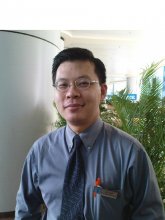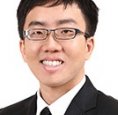In the spotlight is an initiative by PSS that features pharmacists who excel in their area of practice and have been role models for fellow pharmacists. In this issue, we feature:

Mr Ian Wee
Education credentials:
MPharm (Clin. Pharm.), BCPS
Principal Clinical Pharmacist
Changi General Hospital
Area of Interest: Critical Care
Years of Experience: 16 years
Ian graduated with an honours degree in pharmacy from the National University of Singapore (NUS). Starting out as an outpatient pharmacist in Toa Payoh Hospital, he moved to Changi General Hospital (CGH), serving as an inpatient pharmacist before establishing the department’s Drug Information Service. His main interests include critical care, which has been his primary focus of work for the last decade, as well as infectious diseases and therapeutic drug monitoring. In CGH, Ian is actively involved in precepting pre-registration pharmacists, supervising undergraduate and graduate pharmacy students, developing and managing drug guidelines and hospital administrative policies, and participating/supporting ongoing clinical trials. In addition, he spends some time each year at NUS, where he is an Adjunct Assistant Professor in the Department of Pharmacy, NUS.
What others have said about Ian:
"I first got to know Ian as my pre registration pharmacist preceptor. Ian is an excellent mentor, always willing to teach and always willing to provide guidance. Ian's contributions both within and outside of the hospital are evident. He sets high standards for pharmacists alike and is an excellent role model for young pharmacists like myself."
"Personally, I feel that Ian is committed and passionate in improving the care of his patients. Also, he has good rapport with the doctors, nurses and fellow allied health professional that he worked with.
As his protégé, he is always willing to share his knowledge and experience. Furthermore, he is there to help me whenever I have doubts or queries. As my supervisor, he also tries to help me find my direction and help me with my career progression. Overall, he serves as a good role model for junior pharmacists like me."
"Ian is an excellent mentor and teacher. He would take the time to educate and teach you if you so happen to approach him to ask about things. He would explain it in a way that you would understand and make sense. He is not shy to share what he knows and he is very easy to work with."
An Interview with Mr Ian Wee
A: What would your advice be for the younger pharmacists? Especially when faced with challenges?
Be humble – there’s always a new lesson that’ll come your way when you least expect it. Be a sponge – there’s no one too low from which you can’t learn something new. Be proud – of your chosen profession, of the quality of your work, and of who you are.
It’s definitely a job and a half keeping current in pharmacy but I’ve also learnt along the way that to be a good pharmacist, it’s not enough to just be a pharmacist. One needs to understand the roles of the other healthcare professionals and support staff around us, learn from them, appreciate their respective expertise, and perhaps duplicate some of their roles from time to time.
B: What helped / motivated you to be where you are today?
In my final undergraduate year at NUS, I was asked by one of the lecturers what area of pharmacy I would like to be involved in. I replied “a clinical pharmacist”, without having a clear idea of what that meant or what it would take to get there. Every now and then when I’m working with junior pharmacists and students, I’m reminded of what I said those years ago.
My initial interest was in infectious diseases but I realised after a while that I was looking for a more…for what of a better word, ‘all-round’ discipline to work in. I think my early involvement in acute care wards made me gravitate towards critical care because you can’t get more acute than that, apart from perhaps trauma and emergency medicine. I’m glad I discovered I enjoyed critical care pharmacy because I not only get to be involved in acute care but also find that I can help make a difference as part of a multi-disciplinary team. Infectious diseases remains a core element of critical care but so does a healthy dose of cardiology, renal medicine, trauma, the surgical disciplines, etc. I often find working in the intensive care unit like working in a controlled environment where all the time, there’s a geyser bubbling underneath. And you can never tell how your day will turn out – some days I’m left frustrated, other days may leave me quite very satisfied, but it’s never dull.
I’ve also tried to incorporate some research into my work. With pre-registration pharmacists and the medical teams I work with, it’s not difficult to be involved in some form of research or learn to incorporate research in different disciplines into the day-to-day work.
C: Who would you say is your role model, who inspired you to excel in the pharmacy field that you chose?
I’ve had the privilege of having worked with or under many excellent pharmacists, both locally and overseas. Because I feel that my development as a pharmacist has been moulded by the many special qualities of these pharmacists, to identify a single role model would actually be rather unfair to all of the others that I learnt so much from. However, at least in the field of critical care pharmacy, I would recognise the contributions of Dr Judith Jacobi and Dr John Devlin as the best examples of what I would consider as examples of exceptional pharmacists. They showed me how much I didn’t yet know or know enough of, helped me to develop the necessary interest and inquisitiveness, then challenged me to bridge the gaps.
D: What is the most memorable moment in your pharmacy career?
I’ve been asked this several times and honestly, can’t think of one. I’m quite family-oriented so my most cherished memories are really of my family, not of my career. And I think this has to do with a very early lesson I received from one of my preceptors who explained that regardless of whether one is able to meet his career ambitions, what’s more important are the relationships with the people who are closest to you.
E: Describe your career progression path
In August 1996, I started off as an outpatient pharmacist at Toa Payoh Hospital but due to changes associated with the hospital’s shift to Simei (to form the then-New Changi Hospital), became an inpatient pharmacist not long after. I continued as an inpatient pharmacist at Changi General Hospital for less than a year, covering a few medical and geriatrics wards. Then, I was asked by my then-manager, Mrs Joanna Wong, to set up the Drug Information Service where I worked for approximately 3 years. Following the completion of my MPharm overseas rotations around 2002, I returned to the inpatient setting to cover the intensive care units primarily. Along the way, I was also invited to take up an adjunct faculty position with the Department of Pharmacy at the National University of Singapore.
F: My future plans...
Basically to be happy but I’ll take things as they come for now. Outside of work, to travel to every country on earth...umm, too ambitious?



